LOHAS Forum: Living as if the future mattered
Michael Signorella | Jul 3, 2010
I attended the LOHAS Forum at the St Julien Hotel in Boulder June 23-25 and was inundated with a wealth of information on directing one’s life and business towards sustainable practices. If sustainable is too vague a term for you, how about the pithy definition from Alec Loorz, 16-year-old founder of Kids vs Global Warming: “Sustainable: to act as if the future mattered.” Got it.
Let me back up a minute to clarify the slightly unwieldy acronym LOHAS, which is short for Lifestyles of Health and Sustainability. You’re familiar with the terms lifestyles and sustainability; the word health is used in the very broad sense of the term, encompassing not just a healthy body but a healthy spirit, healthy economy, healthy society, healthy ecosystem, etc. OK? Let’s move on.
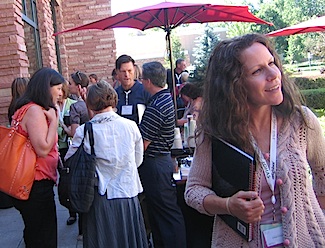
The LOHAS Forum is a soft-sell name for what’s really a business conference. This year’s theme was: “What is next for this decade?” Business was the main focus of most of the discussion. But despite the business-y vibe, this was also the most friendly and open crowd I’ve spent two days with in a long time. Smiling people walk up, introduce themselves and say hello. Really.
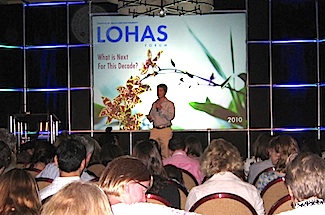
Then, when you start up a conversation, which everyone seems to be eager to do, you find out that they’re savvy business people. They know their numbers. They have successful track records. They have plans for now and for the future. They want to know about you. When I had a moment to look up, I saw a frenzy of friendly networking flooding the St Julien courtyard.
And the weather. The weather was Chamber-of-Commerce-perfect. So many people told me how lucky I was to live in Boulder I almost forgot about my property taxes.
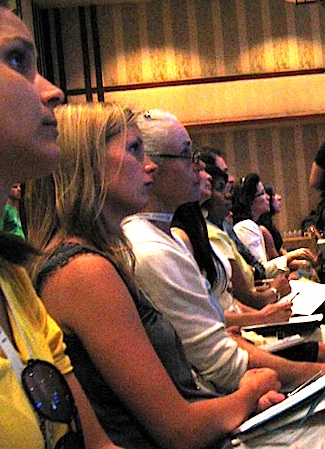
But back to the conference. A small brass bell gently interrupted the intercourse and called us to the speaker presentations. What can I say about the presentations? If you’ve ever spent eight hours at the Met looking at art, you know how stupefying big ideas can be. I’m not fully recovered yet, but I’ll try to give you a taste.
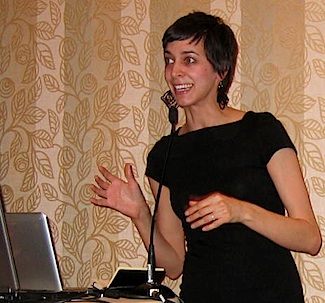
The presentations explored all the directions mentioned previously, from how you might live — ”everything you do has life-diminishing or life enhancing potential, so be mindful,” said 84-year-old Deborah Szekley of Rancho La Puerta — to the current cultural climate of ”Atmosfear,” a term coined by Faith Popcorn; from trying to save the planet — Joel Makower of Greener World Media observed that “random acts of greenness aren’t going to cut it” — to imprinting our children with bad food habits — Dr. Allen Greene, author and physician, said that if we start infants out in life on junk like processed and reformulated foods, that’s what they’ll prefer in later life.
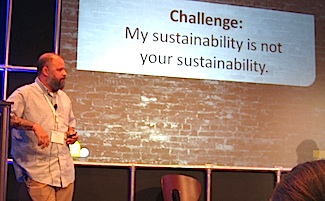
And that’s a very small fraction of the presentations. I do the forum an injustice in attempting to summarize it in a few paragraphs. If you’re interested in seeing more of what was presented I think at some point many of the presentations will be posted on a YouTube channel.
Of course, there were several tech-focused sessions in the Forum that attracted my interest. It’s not news that “world of mouth” (social media) is exploding before our eyes. If you’re already tired of hearing about social media, you’re out of luck, because the LOHAS speakers believe it’s just getting started.
The tech gurus I saw were both entertaining and informative. Boulderite Gwen Bell teamed up with Joey Shepp to deliver a down and dirty list of some the tools that are handy for launching a business into the social-media world. This was just one of the sessions exploring new media. (See a complete lineup of speakers and events on the LOHAS Forum site.)
What was the upshot of the entire event? For me, it was, first, the acknowledgement that we humans do have a few issues, do we not? And, as to solutions, many of the talks suggested that we are — and we need to be — in transition, economically, socially, culturally and (if we’re lucky) spiritually. The old way of doing things isn’t going to work. We need to deliberately “live and work as if the future mattered.”
And while we’re at it, we also need to imagine the best of futures — a future of abundance and not mere survival, as Brian Welch of Ogden Publications emphasized.
But now, as I read this last paragraph back, it reminds me too much of Obama campaign slogans that, in hindsight, sound tired and hollow. So what’s the difference between Obama campaign slogans and the message I heard at the conference? Two concepts, I think:
One concept is that the change that’s needed has to start with you: how you live, how you work and what you do with your time; Uncle Sam can’t fix it for you. And that your every act — every choice you make or don’t make — will have consequences not just for you but for everyone on the planet and the planet itself. With your every act, you’re the predictor of the future.
The second big concept was disruption. It was noted that, in one sense of the word, a significant disruption or breaking down of a system is starting to occur: Wall Street; the Catholic church; lack of trust in government; lack of trust in mega-corporations; a fractured society; economic disparity. All of this is evidence that we need to break down many of our old power structures in order to rebuild them or even question their need to exist. The current power structures have proven to be corrupt and impotent; the new power structures will be less centralized and composed of connected communities, facilitated by new technology. One successful and proven example of this model is the internet itself. It has shown the influence that connected communities of like-minded people can exert on corporations, governments, and other institutions. (A local example of putting this model to use can be found in this publication: The Buzz: more about Naropa turmoil )
I heard a second use of the term disruptive, which was to describe innovations that improve a product or service in ways that the market does not expect. For example, the personal computer was a disruptive product. It changed our world in unimagined ways. The birth control pill was disruptive. Many at the Forum predicted more such innovations will be coming our way, and soon. (John Rooks from the SOAP Group gave a presentation on what disruptive marketing might look like.)
So…when is this future coming? As Ms. Popcorn said, the future is now, and now, and now, and now….
As I sit here today, almost a week later, that’s what’s still resonating with me. For those who were there, I hope you’ll take a minute to share with me your take on the event by posting a comment below. Send photos if you have them and we’ll try to add them to this account. For those of you who couldn’t make it to the Forum, I hope you’ll check out the links in this article. You won’t be disappointed.
(Full disclosure: Michael Signorella designs the annual publication The LOHAS Journal for a long-time client, but he paid his own way to the Forum and wasn’t asked or encouraged to write this story.)
Editor’s PS: Michael, of Studio Signorella, is a Boulder print and web designer who has played a major role in the design and formatting of this site.

